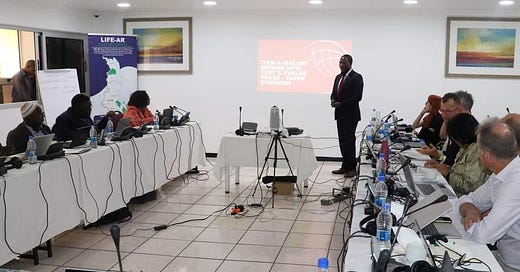Malawi in test and evolve phase in LDC's resilience investment
The test and evolve phase that will see implementation of adaptation and resilience building investments to be piloted in Mangochi, Salima and Rumphi districts.
BOARD RESOLUTION - The board decision to move Malawi from establishment into test and evolve phase underway during the meeting (Photo - Environmental Affairs Department)
SALIMA, Malawi (Planet Defence) – The Least Developed Countries Initiative for Effective Adaptation and Resilience (LIFE–AR) board approved Malawi’s paper that qualifies the country to move from what is called the establishment phase into the test and evolve phase that will see implementation of adaptation and resilience building investments to be piloted in Mangochi, Salima and Rumphi districts writes Planet Defence Correspondent.
LIFE–AR aims at assisting vulnerable communities shift away from business-as-usual approaches to a more effective, more ambitious climate response that adopts a society approach, channeling support to local level where it is most needed, and building in country institutions, capabilities, and systems to deliver climate resilience over the long-term.
The board gave the approval during its seventh board meeting held mid this month. It further commended Malawi LIFE–AR team led by the Environmental Affairs Department for presenting a well detailed board paper. The selection of the Local Government Development Planning System mechanism to deliver climate finance to people at the grassroots using area and village development committees was also lauded as pivotal to achieve results.
LIFE–AR is one initiative that supports LDC’s in achieving the 2050 vision for a climate resilient future: all countries to be on climate-resilient development pathways by 2030 and deliver net-zero emissions by 2050.
Here in Malawi, LIFE– the AR aims to place the country on climate resilient development pathway with a least 70 percent of climate finance supporting local level climate action by 2030.
Among others, the initiative will strengthen capacity of local government and communities to prepare and implement viable projects for climate resilience as well as support locally prioritized climate investments in the mentioned pilot districts.
There are currently 46 economies designated by the United Nations as LDCs, entitling them to preferential market access, aid, special technical assistance, and capacity-building on technology among other concessions.



